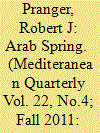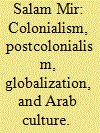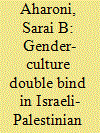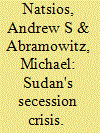| Srl | Item |
| 1 |
ID:
040246


|
|
|
|
|
| Publication |
London, Zed Press, 1983.
|
| Description |
138p.Hbk
|
| Standard Number |
0863561055
|
|
|
|
|
|
|
|
|
|
|
|
Copies: C:1/I:0,R:0,Q:0
Circulation
| Accession# | Call# | Current Location | Status | Policy | Location |
| 025271 | 909.04927/BER 025271 | Main | On Shelf | General | |
|
|
|
|
| 2 |
ID:
111252


|
|
|
|
|
| Publication |
2011.
|
| Summary/Abstract |
In its essence, the Arab Spring is about "being Arab," in the words of the late Lebanese journalist Samir Kassir. This essay explores the two fold meaning of this Arab awakening as the emergence of a homogeneous yet plural field of Arab culture and its integration into the mosaic of global culture. Also assessed are America's careful and selective search for relevancy in this veritable revolution sweeping across the Middle East, the impact of fast-moving events on the US-Israel relationship, and the long-term significance of the Arab Spring for future American policy in the region.
|
|
|
|
|
|
|
|
|
|
|
|
|
|
|
|
| 3 |
ID:
164742


|
|
|
|
|
| Summary/Abstract |
This article will address two major related issues regarding Arab culture as an integral part of the globalization ethos. In order to expand the conceptual parameters of globalization and cultural studies, the exclusivity of political and economic globalization will be interrogated in favor of a more diverse, humanitarian definition of the term. At the heart of this argument, inflected by interdisciplinarity and the literature and theory of postcolonial studies, is tolerance, respect, and recognition of difference and for the marginalized voices of the “other.” The theoretical framework challenges the stereotyping, homogenization, and misrepresentation of Arabs, colonialist ideas that have been carried over into the practice of globalism and the marginalization of Arab history and culture within world heritage. It is my hope to correct the negative perceptions about the Arab people, mainstream misperceptions of politicians, the media, and public discourse. The article will underscore the diversity and complexity of the identity and history of people in the Middle East and North Africa. Although in the West Arabs are usually synonymous with Muslims, a discussion of Islam and/or Islamophobia will not be addressed in this article. The first part will elaborate on the historical context of the creation of the modern Arab world. Next, various definitions of the main domains of globalism and their correlation to the contemporary Arab world will be summarized. Integrated into both sections are two major issues: the creative resistance that has accompanied the founding of the modern Arab world and the impact of globalization on Arab society, concepts that have played out in the containment of this region.
|
|
|
|
|
|
|
|
|
|
|
|
|
|
|
|
| 4 |
ID:
134148


|
|
|
|
|
| Publication |
2014.
|
| Summary/Abstract |
This article investigates structural conditions for women's inclusion/exclusion in peace negotiations by focusing on the linkage between acts of gender stereotyping and cultural framing. Through a narrative analysis of semi-structured interviews with Israeli negotiators and administrators who participated in official negotiations during the Oslo peace process, I link two recent claims about how gender may affect negotiators' understandings of strategic exchange: the gendered devaluation effect and the gender-culture double bind hypothesis. Building upon postcolonial feminist critique, I argue that narratives about women and cultural difference (a) demonstrate and engage with Israeli essentialist and Orientalist discourses about Arab culture and masculinity; (b) manifest how ideas about strategic dialogue and negotiations are gendered; and (c) convey how policymakers and negotiators may use cultural claims to rationalize women's exclusion from diplomatic and strategic dialogue. Furthermore, the study implies that dominant framings of Israeli-Palestinian negotiations as a binary East-West encounter need to be replaced by a more nuanced conceptualization of cultural identity that captures contextual aspects of difference, including the existence of military power and masculine dominance.
|
|
|
|
|
|
|
|
|
|
|
|
|
|
|
|
| 5 |
ID:
100567


|
|
|
|
|
| Publication |
2011.
|
| Summary/Abstract |
Ahead of last weekend's secession referendum in Sudan, Andrew S. Natsios and Michael Abramowitz wrote on the prospects for compromise and reconciliation between the country's north and south.
|
|
|
|
|
|
|
|
|
|
|
|
|
|
|
|